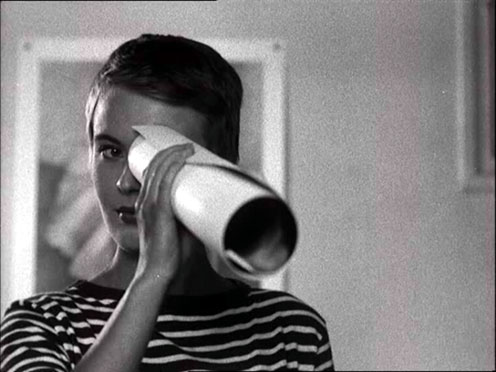I have never seen the ending of Breathless, prossibly one of the most talked about and important films in history. This staggering admission is normally met with incredulous or even reproachful stares – pitying expressions which seem to say "How could you have let this go one for so long?!" In certain circles it seems nearly blasphemous.
I do, however, have a fairly legitimate excuse.
I was watching it in a proper cinema on what was apparently a very old 16mm copy of the original master – for which, our film studies professor explained, we were "…fucking lucky, ungrateful swine." We all watched in silence, afraid to laugh and reveal we didn’t ‘get it’. Just before the climax, a sliver of white light as bright as the sun burst into view like a car skidding out of its lane and proceeded to tear across the screen over the course of a couple minutes (accompanied by a deafaning sound like something concocted by Nurse with Wound) followed by white, then by black and silence.
When a film snaps, it can be repaired will a special kind of sellotape: only a few frames, a fraction of a second, is lost; when it tears diagonally, you might as well throw out the whole reel – unless you’re Stan Brachage, in which case you probably did it on purpose.
Being an impressionable student at the time, I naturally assumed that this was just part of the film. Godard was making us aware of the film’s materiality – some kind of reflexive commentary on the disposable nature of… whatever. In my defence, I had just watched Bergman’s Persona where, I shit you not, that is part of the film. One of the characters gets so angry, she seems to mentally shudder the film reel off of its sprockets, which is followed by the sounds of a bumbling projector-man trying to re-thread reality itself.
So, due to some quite dramatic deus ex machinae, I’ve never seen the ending. Truth be told, I’ve not really made much effort to rectify this. I am no less of a man for only seeing 19/20ths of the quintessential New Wave film, nor have I suffered any lasting emotional scars. I still can hold intelligent conversation at parties. Life goes on.
My point is that this is a great film no matter how you slice it or mangle it. It’s a great film in its beautifully restored incarnation and it’s a great film on your iPhone, on a moving train, while listening to Slayer, while hung over (not that I am in anyway recommending such a movie watching environment).
I think we’d all enjoy films like Breathless a bit more if we weren’t so precious about every frame. We tend to view New Wave films as "high art" and approach them with such hushed reverence that we forget how very funny (even silly) they are. Think of the American producer throwing dinner plates in Contempt or the Borgeois couple setting Emily Bronte on fire in Le Week End. Godard likes his slapstick as much as his literary references and while you might need to have read some books to get some of the jokes, these are films everyone can enjoy even if you don’t have a degree in semiotics.
Breathless of course centres around the character of Michel, a Bogart-obsessive petty criminal who meanders through late 50s Paris like he’s playing Grand Theft Auto. He shoots a cop, beats up some strangers and evades the police, all the while putting the moves on American student Patricia.
Michel seems to be straddling two films – one foot in a cartoon noire universe where secret agent judo-chops actually work, and one foot in a proto-Linklater film where middle class hipsters have flippant conversations about mortality and clothes. There is, happily, no attempt to resolve this contradiction – over-dramatic music plucked right out of a true-crime films accompanies mundane scenes like Michel crossing the street.
It’s clear that Godard is far more interested in the later film – the violence is barely noticible and the dialogue is everything. About a third of the film consists of a single scene of post-coital pillow talk between the protagonists. She quotes Falkner and Thomas, he tries to take her top off.
But the repeated "high-brow" quotations are far more comedy than poignancy. Just try not to laugh at the string of aphorisms the celebrity interviewee prattles off before, in classic french style, droping some existentialism in order to get laid. Breathless is, above all, a celebration of low-brow crime cinema – the kind of American trash Godard and his peers would have enjoyed in the Cinemateque Francaise.
This is not the opera, this is shoot-from-the-hip, DIY, micro-budget filmmaking. The famous "jump-cuts" (skipping forward in time without changing the camera postition), Godard’s avant-garde calling card, was just as much about financial necessity as pissing off continuity editors – he reportedly didn’t have enough money to print any scene where nothing was happening. Either way they make the film lean and efficient – absolutely no unnecessary filler. It’s strange that "jump-cuts" are so admired in film studies and yet they are rarely used. Filmmakers today could learn a thing or two about brevity from this film.
This year Breathless celebrates its 50th anniversary. It sits quite nicely with its New Wave peers in the midpoint of cinema history, somewhere on the line where "modern" cinema begins. I hope that this milestone won’t cause us to stick it further up on a pedestal – only to be watched in hermetically sealed chambers, while taking notes. The film certainly lends it self to obsessive literary analysis, but beneath the surface of clever film-allusions, postmodernism and style, there lies a bedrock of great characters, brilliant dialogue and a wicked sense of humour. Hopefully with its imminent re-release, we can all learn to have fun with it again – maybe even all the way through this time.


